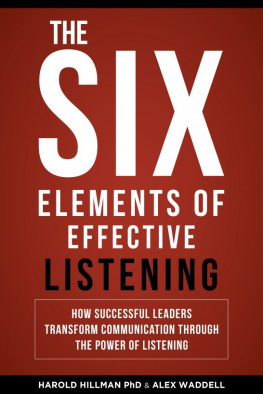HOW TO LISTEN TO GOD
CHARLES STANLEY

1985 by Charles Stanley
All rights reserved. No portion of this book may be reproduced, stored in a retrieval system, or transmitted in any form or by any meanselectronic, mechanical, photocopy, recording, scanning, or otherexcept for brief quotations in critical reviews or articles, without the prior written permission of the publisher.
Published in Nashville, Tennessee, by Thomas Nelson. Thomas Nelson is a registered trademark of Thomas Nelson, Inc.
Thomas Nelson, Inc., titles may be purchased in bulk for educational, business, fund-raising, or sales promotional use. For information, please e-mail SpecialMarkets@ThomasNelson.com.
Unless otherwise noted, Scripture quotations are from the NEW KING JAMES VERSION. 1979, 1980, 1982, Thomas Nelson, Inc., Publishers.
Scripture quotations noted NASB are from the New American Standard Bible The Lockman Foundation 1960, 1962, 1963, 1968, 1971, 1972, 1973, 1975, 1977, and are used by permission.
Scripture quotations noted AMPLIFIED are from The Amplified New Testament, 1954, 1958 by the Lockman Foundation (used by permission).
Scripture quotations noted KJV are from the King James Version of the Bible.
ISBN 978-1-4002-8051-3 (repak)
Library of Congress Cataloging-in-Publication Data
Stanley, Charles F.
How to listen to God.
p. cm.
ISBN 978-0-7852-6414-9
1. Revelation. 2. ListeningReligious aspectsChristianity. I. Title
BT127.2.S75 1985
231.7'4
85-21769
Printed in the United States of America
08 09 10 11 12 QW 5 4 3 2 1
To my grandfather,
George Washington Stanley,
who taught me early in life how to listen to God.
CONTENTS
P eople often ask me, When I listen to God, how do I know if it is God speaking or some other voice? or, Ive asked the Lord to give me direction, but its as if I hear two voices. How do I know if God is the One I hear or if Satan is involved? Or am I just talking to myself?
Those are legitimate questions that need to be answered. Identifying who is doing the talking is essential if we are to listen accurately.
In Matthew 16 Jesus told His disciples that He must go to Jerusalem, suffer many things, be killed, and then be raised up on the third day (v. 21). Peter, though with obvious good intentions, took affront at Jesus remarks and said, Far be it from You, Lord; this shall not happen to You! (v. 22). Jesus turned to Peter and stated, Get behind me, Satan! You are an offense to Me, for you are not mindful of the things of God, but the things of men (v. 23).
In this passage you can see the difference between the voice of God and the voice of Satan. Peters dilemma in this instance is also ours. We wonder how we can know positively whose voice we hear.
The intent of How to Listen to God is to help you understand that God does still talk to us today, but we must learn to listen for His voice. This principle is paramount to spiritual maturity and growth in our relationship with God. Your relationship and attitude to God can be free from distortion. It is my prayer that this book will help you to listen to the God who wants to speak to you.
P salm 81 is a sad saga of a people who would not listen to God. The compassionate heart of the Father in His numerous attempts to gain Israels attention and devotion and their persistent rejection are revealed in verses 814:
Hear, O My people,
and I will admonish you!
O Israel, if you will listen to Me!
There shall be no foreign god among you;
Nor shall you worship any foreign god,
I am the LORD your God,
Who brought you out of the land of Egypt;
Open your mouth wide,
and I will fill it.
But My people would not heed My voice,
And Israel would have none of Me.
So I gave them over to their own stubborn heart,
To walk in their own counsels.
Oh, that My people would listen to Me,
That Israel would walk in My ways!
I would soon subdue their enemies,
And turn My hand against their adversaries.
One can feel the heartbeat of God as He pleads for the nation of Israel, saying, Please listen to Me. Please hear My voice. Each of us, too, should ask, Lord, have You been trying to tell me something that I desperately need to hear? Are You exhorting me to listen to Your voice? I wonder how many times God has spoken to us and we were not listening. I wonder how many times He had something specific we needed to hear, but we were too occupied to pay attention.
There was a time in my ministry when I was too occupied doing the Lords work to pay attention to Gods voice. I was preaching six times a week, taping two television programs, traveling across the country, writing a book, pastoring the church, and administrating a large church staff and broadcast ministry (among other daily duties). As a result of all this activity, I found myself in the hospital for a week and out of circulation for three months. As I look back over that time, I realize God was trying to get my attention through my body, but I didnt listen. Then, finally, I couldnt go any further.
I believe one of the most valuable lessons we can ever learn is how to listen to God. In the midst of our complex and hectic lives, nothing is more urgent, nothing more necessary, nothing more rewarding than hearing what God has to say. And, the Bible is explicit, God speaks to us just as powerfully today as in the days in which the Bible was written. His voice waits to be heard, and having heard it, we are launched into the greatest, most exciting adventure we could ever imagine.
WHY GOD SPEAKS TODAY
We might ask, Why would God still want to talk to us today? Hasnt He said enough from Genesis to Revelation? There are several compelling reasons why God still has His lines of communication open with His people.
First and foremost, He loves us just as much as He loved the people of the Old and New Testament days. He desires to fellowship with us just as much as He fellowshipped with them. If our relationship with Him is a one-way trip and there is no communication or dialogue between us and the Lord Jesus Christ, then there isnt much fellowship. Fellowship is nil when one person does all the talking and the other does all the listening. God still speaks to us today because He wants to develop a love relationship that involves a two-party conversation.
The second reason God still speaks today is that we need His definite and deliberate direction for our lives, as did Joshua, Moses, Jacob, and Noah. As His children, we need His counsel for effective decision making. Since He wants us to make the right choices, He is still responsible for providing accurate data, and that comes through His speaking to us.
A third reason God speaks today is He knows we need the comfort and assurance just as much as the believers of old. We have Red Sea experiences, when our backs are to the wall and we do not know which way to turn. We undergo failures just as Joshua and the people of Israel did at Ai. When we undergo such defeats, God knows our need for His assurance and confidence.
I believe the most important reason God is still talking today is that He wants us to know Him. If God has stopped talking, then I doubt we will ever discover what He is really like. If the priority of all our goals is to know God, then there must be more than just a one-way trip. Rather, there must be a communication link in which He talks to us and we listen or we talk to Him and He listens.
HOW GOD SPOKE IN OLD
AND NEW TESTAMENT DAYS
If God is still talking, how does He speak? We can discover His methods by reviewing the different ways He revealed Himself in Old and New Testament days.
Next page


















